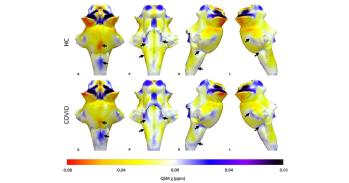A young researcher working at the University of Cambridge’s Centre for Brain Repair has been commended at the Houses of Parliament for his research on Parkinson’s disease.
A young researcher working at the University of Cambridge’s Centre for Brain Repair has been commended at the Houses of Parliament for his research on Parkinson’s disease.
A young researcher working at the University of Cambridge’s Centre for Brain Repair has been commended at the Houses of Parliament for his research on Parkinson’s disease.
Dr George Tofaris was one of the six groundbreaking young scientists to receive awards in the National Competition in Biosciences.
The 170 entrants to the competition were invited to Parliament earlier this month to give a short presentation on their work in front of a panel of judges made up of university professors and experts from the bioscience industry.
Dr Tofaris impressed the judges with a presentation on his PhD research, which was undertaken as part of the combined MB/PhD course at the laboratory of Dr MG Spillantini. His research aims to understand how alpha-synuclein accumulates inside brain cells. The accumulation of this protein is directly linked to the cause of Parkinson's and it is hoped that understanding how this process occurs could pave the way for new therapies. For this purpose he used molecular biology techniques to study alpha-synuclein in cells and disease tissue, and generated a novel transgenic model of Parkinson's disease.
The event was also an opportunity for the young scientists to raise awareness among MPs about the importance of their research. The competition was organised by 'SET for Britain' (Science, Engineering and Technology awards), along with Members of Parliament.
"It was exciting to talk about our research in the Parliament and challenging to present to non-expert groups," said Dr Tofaris.
Parkinson's is a progressive neurological condition affecting movements such as walking, talking and writing. Apart from tremors and muscular rigidity, the disease can also cause tiredness and depression.
Worldwide, it is estimated that up to six million people have been diagnosed with Parkinson's. Onset can occur at any age, but the average age at which symptoms begin is 55 to 60. Currently, there is no permanent cure.
This work is licensed under a Creative Commons Licence. If you use this content on your site please link back to this page.





